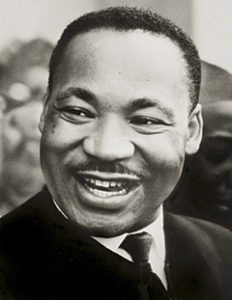Friends,
Social activist Paul Rogat Loeb writes that “only someone who knows how good life can be is in a position to appreciate what’s at stake when life is degraded or destroyed.” I thought about this recently when I came across a picture of Martin Luther King, Jr. laughing. Not this exact picture, but if you Google “Martin Luther King laughing” you’ll find a whole series of pictures of him in joyful moments. These images are striking to me. Why have I never thought about Dr. King’s smile or laughter? I read a story over winter break about Archbishop Desmond Tutu dancing after giving a speech about apartheid and in the midst of fighting prostate cancer. I was struck by this as well.
I wondered, how else would activists like these and others continue in their work as activists without moments of joy? If the dream and vision for the work is humanity, dignity, and equity, if all of us benefit from a world free of racism and bias, what drives the daily work forward when that vision feels compromised, out-of-reach, or impossible? I suspect, I hope, that one of the small, daily engines that drive us is joy. Moments of joy are reminders of just how good life can be, and they strengthen our relationships, our attachments to one another, and our common experience of love.
In Martin Luther King, Jr.’s essay “An Experiment in Love,” he writes about the Greek concept of agape, a kind of love that is spontaneous, that springs from our need for one another, and that seeks the good of its neighbor, regardless of the status of that relationship. Dr. King writes that agape is “disinterested love” because it does not discriminate “between worthy and unworthy people.” Love of this nature is certainly degraded or destroyed by racism and other systems of oppression. Moments of joy, though, make us present with one another in such a way that we see the other more clearly and in such a way that we claim each other, person to person. When we begin to see that we belong to one another, the work led by Dr. King, Archbishop Tutu, and others, seems all the more imperative.
There are many reasons why we might approach the Martin Luther King, Jr. holiday with seriousness. There are many ways we might use it to recharge and remind ourselves about the importance of Dr. King’s message and work. I wonder, though, what might be gained by considering what it might have been like to laugh with him, what it is like to laugh with each other, and how small and present joys can be motivators for justice.
Love,
Jason
